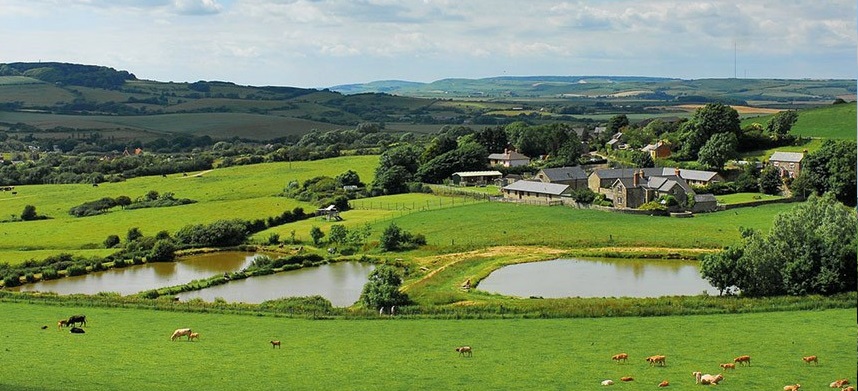
Rural communities across the UK will have access to £138 million to create more jobs and boost the rural economy, Farming Minister George Eustice announced today.
The approach, known as LEADER, will give local communities power to support projects in their own area, building on the Government’s devolution commitments under its Rural Productivity Plan.
Projects previously funded include villages benefiting from heritage funding to boost tourism, farmers diversifying into farm shops, ice cream parlours and camping sites and local food producers of cheese and meats supported to expand their product lines.
Commenting ahead of a speech in London to successful Local Action Groups, Farming Minister George Eustice said:
“We want to grow our rural economy, which is why we’re making funding available to local communities so they can invest in projects to bring more jobs and enterprise to their areas.”
Following a competitive selection process, 80 Local Action Groups covering 85% of rural England, and made up of local businesses and voluntary groups, will be able to allocate money to rural businesses and kick-start new projects to deliver local jobs and growth.
The Rural Payments Agency (RPA) manages the LEADER scheme nationally and will make payments to successful applicants. Chief Executive of the RPA Mark Grimshaw added:
“The great thing about the scheme is the level of collaboration between government and local communities. We have a common purpose and a strong belief that we can work in partnership to allow the rural economy to grow.
“But this is all about local delivery using local knowledge, and I am looking forward to working with the 80 Local Action Groups, using the experience that the agency has in administering similar schemes, over the lifetime of the LEADER to make a real world difference to rural communities.”
This approach builds on August’s announcement by the Chancellor and the Environment Secretary on the Government’s first ever Rural Productivity Plan which will boost productivity and ensure the countryside becomes an even more attractive place for people to live, work, start a business and bring up a family.
Case Studies
Already hundreds of rural businesses and communities across England have benefited from LEADER funding available through the 2007-2013 Rural Development Programme.
Rural entrepreneurs have used the funding for farm diversification, to boost forestry productivity, promote tourism and support cultural heritage. Examples include:
BUCKINGHAMSHIRE
Town Farm
Town Farm in Ivinghoe is a working farm at the foot of the Chiltern Hills boasting around 1,000 sheep. Its owners successfully received funding to expand their business and they are now welcoming guests to their camping and caravanning site each year.
CUMBRIA
Lakes Free Range Eggs
The Lakes Free Range Egg Co Ltd produces and packs free range and organic eggs sourced from 46 family farm suppliers located throughout Cumbria. LEADER funding has enabled them to equip the factory with new egg packing and grading technology, leading to the employment of a further 11 people.
DERBYSHIRE
Big Fernyford Farm
Big Fernyford Farm in Buxton received funding to transform its agricultural buildings into self-catering holiday accommodation. It now provides a picturesque and authentic on-farm experience for families, leading to increased employment and additional income for the farm.
Bonsall Heritage Project
The Bonsall Heritage Project received funding to restore, maintain and improve heritage sites within Bonsall Parish, including historic wells, fountains and war memorials. The project also supports the long term use of these monuments for school and village events, along with the summer custom known as ‘Well Dressing’ practised in rural England. This ancient custom involves Derbyshire villages decorating water sources with designs created from flower petals. Involving all local residents, a traditional well dressing can take up to seven days, and is followed by a procession and carnival.
WITLSHIRE
Broad Chalke Community Hub
The project converted an underused community building into a community-run shop, including post office, bakery and coffee shop. The building also hosts the local police officer and the village archive, and the shop sources much of its stock from within a 15 mile radius. The business model created the job of a full time shop manager, who is supported by a team of volunteers.
HAMPSHIRE
JDB Forestry Contractors
JDB forestry contractors near Eversley received funding to purchase a new tractor and rotating wood splitter to boost the productivity and energy efficiency of its woodchip, biomass energy business.
NORFOLK
Cranswick
Cranswick Norfolk was awarded funding for a sausage factory at Watton in Norfolk in October 2010 by the Brecks Local Action Group. This funding has led to 71 staff being employed and when at full production the new venture will have created 86 jobs for the local area. The grant is to upgrade existing premises and to construct a new unit for 5 production lines. This funding has enabled Cranswick to expand their business in Norfolk and produce a range of pork sausages packaged and distributed in East Anglia.
WEST SUSSEX
Caroline’s Dairy
Caroline's Dairy in Sidlesham now generates additional income from ice cream made using milk from the family farm. The funding the owners received enabled them to invest in new equipment, including an ice cream tricycle and freezer van to expand their production and sales.
YORKSHIRE
Stanza Stones Trail Bridges
The 47-mile Stanza Stones trail bridges the expanse of the South Pennines landscape, linking six stones describing water in its many forms: beck, puddle, mist, rain, dew and snow, and each featuring a poem by Marsden-born Simon Armitage. With support from LEADER, the project was created by Ilkley Literature Festival in collaboration with Simon Armitage and managed by Pennine Prospects.
